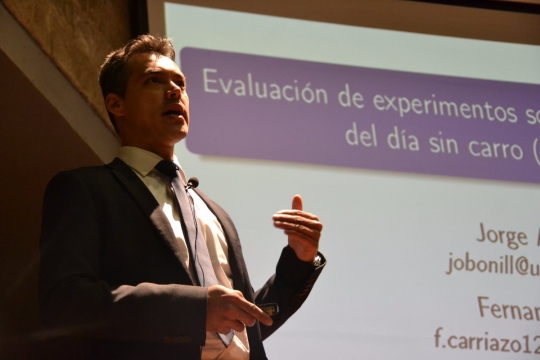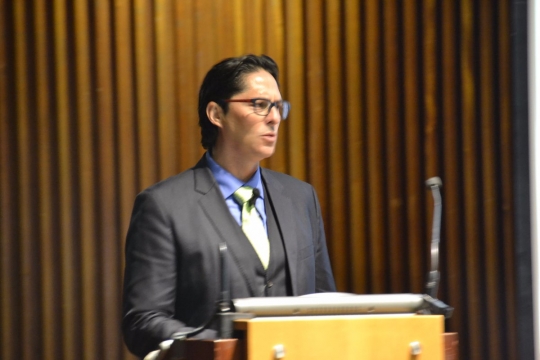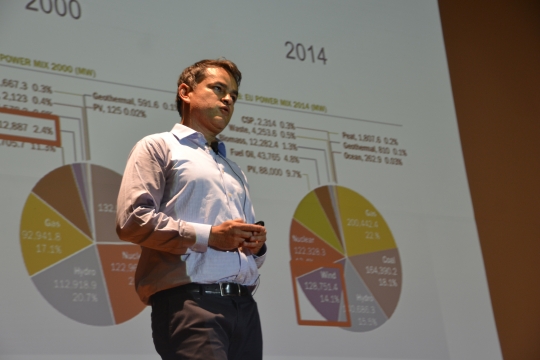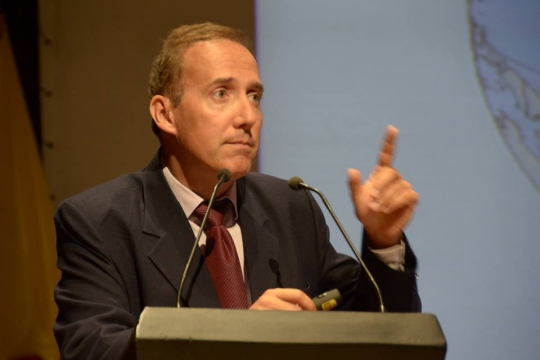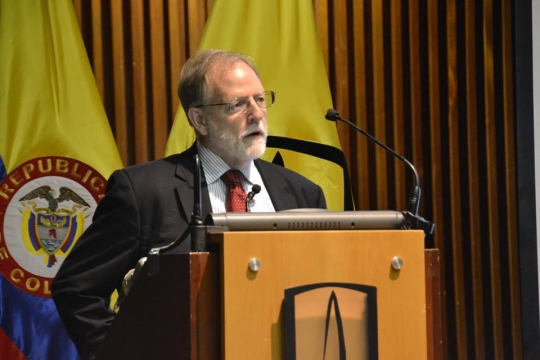A Symposium on Green Growth and Economic Policy was held at Universidad de Los Andes, Bogotá, July 18-19, 2017. The four main sessions of the symposium were: economic modeling; behavioral economics for green growth; circular economy and economic and financial instruments.
Each session had a key speaker from a national or international university or a international organization. In the first section of the Symposium “Economic modeling”, the key note speaker was Gaël Giraud, chief economist for AFD, (Agence Française de Développement ) who gave the conference “Macroeconomics and climate”. In his talk, Giraud explained that there are different macro models that include climate models. For example, welfare optimization models, general equilibrium models, partial equilibrium models, simulation, and cost minimization models. These models have different challenges, for instance, in the welfare optimization models and cost minimization models it is necessary to define a discount rate, which is an issue of continuous discussion. Giraud presented the research program of AFD, which includes the GEMMES model (General Monetary Macro-dynamics for the Ecological Shift). This model includes private and public debt. It is also possible that the model includes data from NASA (National Aeronautics and Space Administration) that illustrate the consequences of climate change over a territory.
In the second section of the Symposium “Behavioral economics for green growth”, the key note speaker was EfD- Central America Senior Researcher Francisco Alpízar. His talk was titled “Inputs from behavioral economics for the design of green growth policies for developing countries”. In his speach, Alpízar remarked the relevance of the inputs that come from behavioral science for the design of policies for sustainable consumption. To achieve changes in development, it is necessary to reach changes in behavior because consumers and firms make everyday decisions and take actions that taken together have a great impact on the resources of the planet. Since individuals react differently to policies and rules depending on economic variables like income level and social context, it is necessary to study the reaction of individuals to policies. In this section of the symposium, EfD researcher Juan Camilo Cárdenas guided the discussion on behavioral economics oriented to green growth. EfD researchers Jorge Bonilla and Jorge García also presented their recent work on socio-economic experiments for the design of sustainable economic policies. Jorge García talked about his research paper “Willingness to accept local wind energy development: does the compensation mechanism matter?”, and Jorge Bonilla talked about some advances of his research “Assessing social experiments using apps: the case of car-free days in Bogota”.
The third section of the symposium was on circular economy, Arnold Tucker, Professor of industrial ecology of Leiden University was the key note speaker. In his talk “Towards a circular economy: some (in) convenient truths and policy lessons”, Professor Tucker commented that there is a relationship between circularity and green growth because eternal economic growth is difficult to achieve and at the same time, growing economy inevitably needs virgin materials. He emphasized that there are scientific needs for circularity, for example: environmental and economic system analysis, new circular technologies and designs that reduce the use of primary resources, new circular businesses models and value chains, new policy, and governance.
In the last session of the symposium on economic and financial instruments, EfD researcher Michael Toman gave a talk titled “Economic policy instruments for moving towards a greener economy”. Michael Toman explained that over use of natural resources or environmental degradation is a problem of low prices for these resources. Policy instruments that correct this situation are: property rights, reduction of economically wasteful and environmentally harmful subsidies and generation of economic incentives for more efficient use of non-market mechanisms. Policy makers could also formulate policy instruments with an indirect approach; for example, taxing things correlated with environmental harms could be a relevant tool for sectors like agriculture and transport and defining subsidies for environmentally positive activities, such as grants to farmers for less-polluting practices.Over 300 participants attended the event, from universities (from Bogotá and other regions), public entities (national and regional entities), private sector, multilateral agencies and NGO’s. This made the event a successful policy interaction space with different and relevant actors.
The entire event was live streamed and you can see the presentations in the following link
The Symposium was sponsored by the Economics Department at Universidad de Los Andes, Colombian national entities (National Planning Department and the Ministry of Finance), the Colombian Mission for Green Growth, and international agencies, AFD (Agence Française de Développement), the Inter- American Development Bank (IDB), and the Global Green Growth Institute (GGGI).
